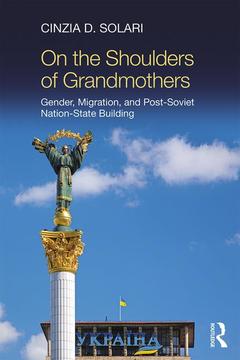On the Shoulders of Grandmothers Gender, Migration, and Post-Soviet Nation-State Building
Auteur : Solari Cinzia

On the Shoulders of Grandmothers is a global ethnography of Ukrainian transnational migration. Gendered migrant subjectivities are a key site for understanding the production of neoliberal capitalism and Ukrainian nation-state building, a fraught process that places Ukraine precariously between Europe and Russia with dramatic implications for the political economy of the region. However, processes of gender and migration that undergird transnational nation-state building require further attention. Solari compares two patterns of Ukrainian migration: the "forced" exile of middle-aged women, most grandmothers, to Italy and the "voluntary" exodus of families, led by the same cohort of middle-aged women, to the United States. In both receiving sites these migrants are caregivers to the elderly.
Using in-depth interviews and ethnographic data collected in three countries, Solari shows that Ukrainian nation-state building occurs transnationally. She examines the collective practices of migrants who are building the "new" Ukraine from the outside in and shaping both Italy and the United States as well. The Ukrainian state, in order to fulfil its First World aspirations of joining Europe and distancing itself from all things Soviet, is pursuing a gendered reorganization of family and work structures to achieve a transition from socialism to capitalism. This has created a labor force of migrant grandmothers who carry the new Ukraine on their shoulders. Solari shows that this post-Soviet economic transformation requires a change in the moral order as migrant women struggle to understand how to be "good" mothers and grandmothers and men join women in attempts to teach their children to be successful and honorable people, now that the social rules have drastically changed.
Looking at individual migrant women and men and their families in Ukraine allows us to see the production of neoliberal capitalism and new nationalism from the ground up and the outside in for a region that promises to be a flashpoint in our century.
Table of Contents
Acknowledgments
Notes on Transliteration and Participants
Introduction: "Gulag" vs. "Promised Land:" Metaphors of Destination
and Transnational Social Fields
PART I: GENESIS: UKRAINE
1: Markets, Moralities, and Motherhood in Transition
PART II: EXILE: ITALY
2: Italy’s Context of Reception and Connections to Ukraine
3: Narratives from the "Gulag"
Inna: Becoming Capitalist in Europe
Tatiana: Sacrificing for Motherhood
Oksana: Talent Shows Performing Family, Nation, and Ethnicity
Yuriy: Negotiating post-Soviet Masculinities
Lydmyla: A Family Aspiring to be European
Social Patterns in Exile
Part III: EXODUS: THE UNITED STATES
4: California’s Context of Reception and State-based Integration
5: Narratives from the "Promised Land"
Viktoria: Married to the U.S. State
Dariya: Discovering my Capitalist "I" in the United States
Kateryna: Defining Children’s Success in the Promised Land
Zhanna: Reinventing Babushka acrossMigration Waves
Halyna: Undocumented but Playing the Green Card Lottery
Social Patterns in Exodus
Conclusion: Berehynia Femininities, Cossack Masculinities, and New Nationalisms
Appendix
Bibliography
Index
Cinzia D. Solari is Assistant Professor of Sociology at the University of Massachusetts Boston. Her papers on gender, migration, and nationalism have been published in journals such as Gender & Society, The Journal of Ethnic and Migration Studies, and The American Behavioral Scientist.
Date de parution : 08-2017
15.2x22.9 cm
Date de parution : 08-2017
15.2x22.9 cm
Thèmes d’On the Shoulders of Grandmothers :
Mots-clés :
Young Men; Ukraine; Transnational Social Field; Migration; Ukrainian Migrants; Exodus; Filipina Migrant Domestic Workers; Exile; Homecare Workers; Transnationalism; Green Card Lottery; Transnational Studies; Migrant Domestic Workers; Nation State; Ukrainian Greek Catholic; Emigration; Nation State Building; Family; Ukrainian Men; Ethnography; Diaspora Ukrainians; Globalization; Post-1991 Migrants; Economic transition; Ukrainian Women; Care work; Ukrainian State; Eastern European Studies; Green Card; Nationalism; Ukraine EU Relation; Post Soviet Studies; Soviet Gender Order; Care; Domestic Work Sector; Cinzia D; Solari; Sponsor Family Members; Guest Visas; Ukrainian Organizations; Filipina Migration; Green Card Holders; Federal Fair Labor Standards Act; Permanent Residents



